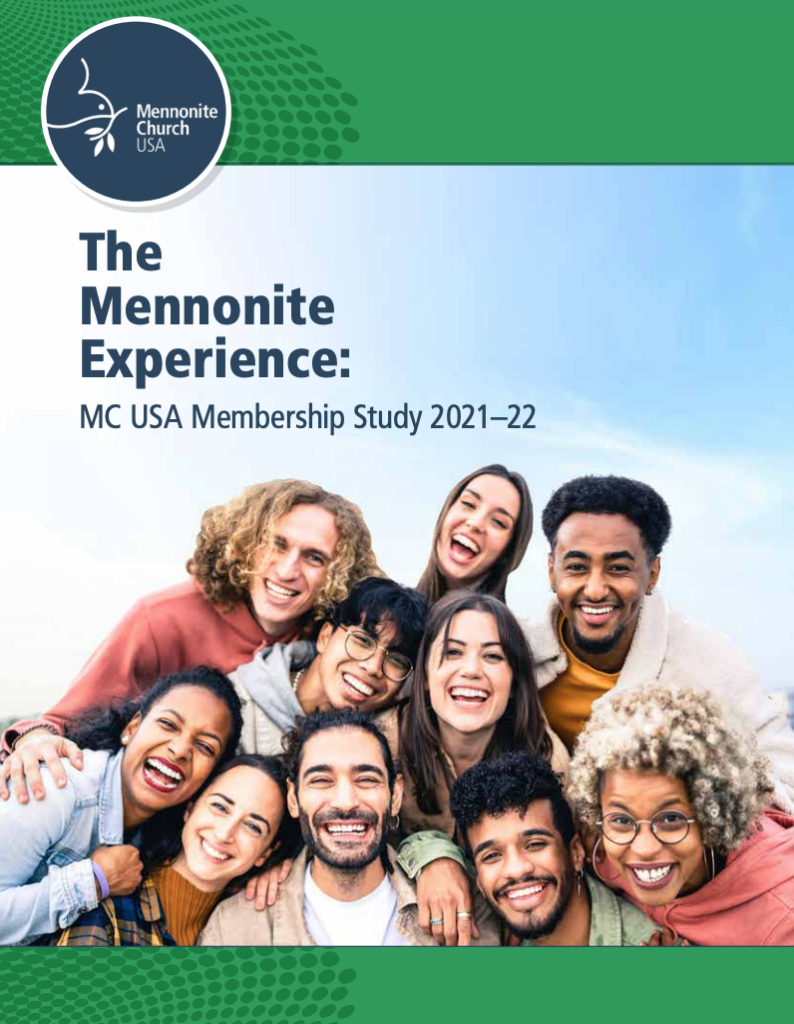 ELKHART, Indiana (Mennonite Church USA) — Mennonite Church USA has released the executive summary of “The Mennonite Experience: MC USA Membership Study 2021-22.” The Executive Board commissioned the study to examine what it means to be a Mennonite and a member of MC USA and how this has changed in the past 16 years. The full-length study will be available in July 2022.
ELKHART, Indiana (Mennonite Church USA) — Mennonite Church USA has released the executive summary of “The Mennonite Experience: MC USA Membership Study 2021-22.” The Executive Board commissioned the study to examine what it means to be a Mennonite and a member of MC USA and how this has changed in the past 16 years. The full-length study will be available in July 2022.
Springtide Research Institute conducted the research project as a follow-up to Conrad Kanagy’s “Road Signs for the Journey: A Profile of Mennonite Church USA,” published in 2007.
“The new study will provide us with a more accurate and up-to-date snapshot of the denomination and will be a helpful tool for the Executive Board, agencies, and conferences as we work together to live into our Renewed Commitments in our churches, conferences and communities,” said Glen Guyton, MC USA executive director.
Some key findings of the study are:
- Members embrace the core faith values of the denomination. The majority of the 2,276 respondents agreed that their most important personal faith commitments are following Jesus in daily life (84%), expressing Christian love in all relationships (80%), peacemaking/nonviolence (76%) and serving others inside (69%) and outside (75%) of the church.
- Peace and justice work is essential. Participants ranked peace and justice work (68%) and sharing God’s love in word and deed (65%) as essential activities that MC USA provides to its members. Issues of most concern were racism, environmental destruction, global warming and violence in America.
- MC USA is making progress as an increasingly diverse and inclusive community. The majority (56%) of respondents today define a Mennonite as “one who agrees with Mennonite theology,” rather than “someone born into a Mennonite family” (1%). More than one-third (36%) say they had been members of non-Mennonite congregations, compared to just 14% in 1972. In addition, a full 70% of MC USA members say that excluding people based on race, gender, sexual orientation, or any other identity is inherently at odds with what it means to be Mennonite.
“I might be happy to let some [Mennonite traditions] go if it was for the sake of embracing and benefiting a diversity of cultures and voices within the church,” said one participant.
- Members have close ties with their congregations. Most participants indicated a strong tie with their local congregation (87%), followed by the denomination (75%), the broader Christian congregation (70%), and then the area conference (60%). A high percentage (85%+) of respondents said that their congregations cared what happened to them personally, helped members deepen their relationship with God and helped them feel connected to a community of believers. However, a majority of respondents said politics and too many divisions overall were affecting congregations’ ability to live out the core mission of following Jesus Christ.
- Congregations look to the denomination for resources. In follow-up interviews, members emphasized the importance of resourcing from the denomination in supporting local initiatives. They said that resources typically take the form of financial support (e.g., grants), training opportunities to improve lay leadership skills (e.g., conflict management), and educational materials for local congregations (e.g., Sunday school coursework).
- Program agencies are important. MC USA program agencies and other affiliated organizations are an important feature of the denomination through which members find connection, according to the study. The agencies that MC USA members use “often” or “all the time” are Everence (63%), MennoMedia (51%) and Mennonite Mission Network (43%).
- Dissatisfaction with leadership seems to correspond to lack of awareness or clarity. Less than half of the respondents said they were satisfied with the Executive Board of MC USA, but 27% said they do not know the scope of the Executive Board’s responsibilities.
“The study challenges us to find more creative and effective ways to reach constituents and to encourage them to engage with our current communications, such as PeaceMail and social media,” said Guyton.
- There is almost unanimous support (92%) for women in pastoral roles.
Participants in the study self-identified as white (92%), heterosexual (85%), 45 years of age and older (75%), well-educated and regular church goers.
The full study, which also includes excerpts from interviews with 63 of the respondents, will be available in July.
Mennonite Church USA (MC USA), is the largest Mennonite denomination in the United States with 16 conferences, approximately 530 congregations and 62,000 members. An Anabaptist Christian denomination, MC USA is part of Mennonite World Conference, a global faith family that includes churches in 58 countries. It has offices in Elkhart, Indiana and Newton, Kansas. mennoniteUSA.org

